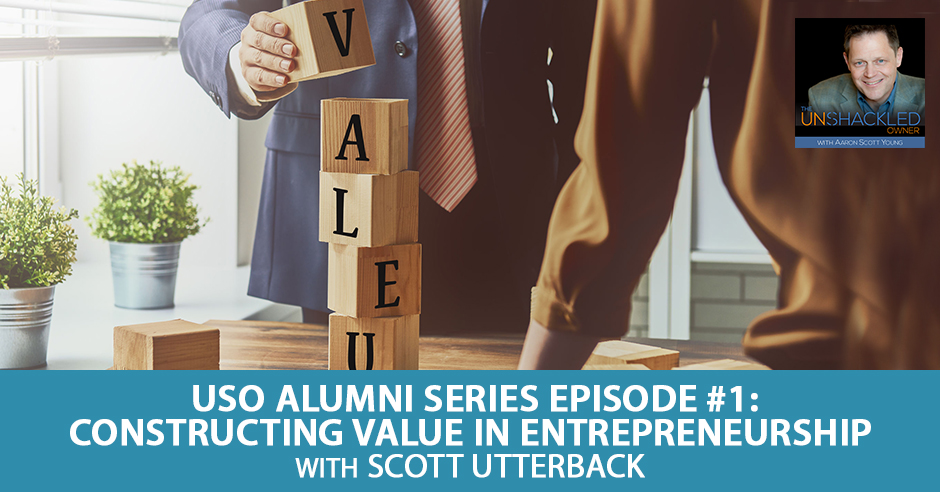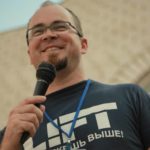
Scott Utterback moved away from his family to start his construction business at twelve years old. Since then, there have been countless stories and lessons learned on his entrepreneurial journey. For the sake of education, Scott took on job positions people didn’t want just so he would learn things, demonstrating that there is not one path to educational success. Soon enough, he became a general contractor and went into retail which added a whole new dimension. Scott talks about constructing value in entrepreneurship and stresses the importance of seeking education and opportunities to identify the real a condition of your industry. This allows us to restart a conversation that will allow us to not only make not a difference in our own company but a difference in the industry itself.
—
Listen To The Episode Here
USO Alumni Series Episode #1: Constructing Value In Entrepreneurship with Scott Utterback
It’s great to be with you here for the beginning of a special series of interviews that I’m going to be doing. I’ve interviewed lots of people from lots of backgrounds over the course of the show. I’ve done a number of monologues where I’ve taught lessons and said things that were on my mind. It occurred to me that I’m well-acquainted with a bunch of very interesting entrepreneurs, people who are doing cool things. People who are in transitions between cool stuff. People who have learned interesting lessons as they’ve gone through the Unshackled Owner Intensive Program. My eight-week course where I teach you the lessons I’ve learned about how to be a business owner, not just the most critical employee of the company, but how to own a company as an asset. I thought there are some interesting and diverse stories amongst those people who have gone through the class. This is going to be our very first interview with one of those people. You’ll find it to be surprisingly real, raw and maybe interesting in a way that you wouldn’t expect on a podcast.
We’re talking with an interesting guy named Scott Utterback. Welcome to the program, Scott. We met in an event years ago. We liked each other. We hit it off. We’ve talked about a lot of things and seen each other at a lot of places. Full disclosure, Scott has become a buddy of mine, a guy that I like as well as a client. Scott, I met you well into your career. Would you tell us where did you start out? Where were you born? Where did you grow up? What was that circumstance that began to shape the man that you would become? Where did you get started?
I grew up in the San Jose Bay Area. I was there until about eighteen years old before leaving California. I spent a little bit of time overseas and that’s where my history in terms of entrepreneurship and construction began. I grew up next to Pleasant Hills Golf Course in San Jose and did the whole thing of collecting golf balls and selling them back on the course. That was my first little business venture. Getting a taste for that grew me into the desire for being a business owner.
Besides the golf ball collection, when did you start working for yourself as an adult making real money?
Uniquely enough on the golf course, I heard a guy is over talking about doing construction work overseas. It caught my attention. I broke the rules of age, the age that I was at. I moved to India at twelve and that’s where I started my construction career. India at twelve and then moved to Switzerland after a year in India at thirteen, and a couple of months in Germany and then going back to the United States.

Constructing Value: For every person coming into the industry, five people are leaving.
This was you on your own or with your folks?
This was on my own. My parents were not involved.
That’s a whole other story. At twelve years old, you went to India which is not a real mellow, calm, placid place. This is a busy, crowded, utterly foreign land from the Bay Area. What did you do in construction as a twelve-year-old?
I was on the foundation crew. There was a couple who was in there will at what point. They passed that their assets would be liquidated for the sake of building an outpatient clinic. I was on the starter crew, a one-square acre facility, outpatient clinic. We were there doing the foundation.
You moved from India to Switzerland. After a year in India, that would be a big change. Another language, I guess the people on the crew spoke English. What did you do in Switzerland? Did you concrete again?
We renovated the inside of a building that was built in the late 1600s. We are helping them develop a new ski slope and a resort. I went from concrete work to doing interior finishing. That’s where I realized I prefer and like interior finishing.
Especially in Switzerland, I bet. In India it would have been very hot. Here you are a teenager and you’ve learned some skills, where did that take you?
When I came back to the US, I came back to California and started working for a construction company in the San Jose Bay Area. At evening time, I took on a home-based job and some of those places learning plumbing, electrical, whatever positions people didn’t want that had the most parts and pieces to learn is what I wanted. I specifically took on jobs knowing that they were for the sake of education. I wanted as many diverse jobs in construction that I could get my hands on, which I did for almost four years.
You did this instead of high school?
I was one of the early homeschoolers.

Constructing Value: If we’re so busy trying to service our debt, we don’t have the time to go out and build something that’s going to make us wealth.
You were not only getting this apprenticeship. At that point, you would become a journeyman and learning all these skills, you were going through this learning process with building. You’re also passing off whatever classes you have to so that you can have a high school graduation or equivalency. I went to high school, but I did high school badly. Then I went to one year of junior college and that was the extent of my formal education. I’ve got a son, my youngest boy. He dropped out of high school and got his GED. Now, he’s on a scholarship at a major university in Japan. There’s not one path to your educational success. I love Jim Rohn comment about formal education will make you a living, self-education will make you a fortune. You are a naturally curious guy even as a kid. You weren’t trying to sit back and watch TV all day. You’re working. Off you go, you get this education and learn all these skills. Did you become a general contractor as a young man?
I did, building homes, retaining walls, roofing, anything I could get my hands on. When I was at home-based, I started doing cabinet installation for them outside of their employment. That got me back to my enjoyment and love for doing interior work. I became a kitchen and bath specialist, which has been my forte ever since. From there, I opened up my first store in Colorado for home improvement. I ended up with three stores across the state and there for ten years. I went to Oregon for almost fifteen years and had two stores there. At both locations, I had an independent construction company who’s doing a residential construction, some new homes. Then another company that focused on the kitchen and bath remodel aspect of things. That’s what I’ve been doing up to now.
Over these years, as a guy who is constantly learning and you opened up, not only did you get a lot of people do and be the general contractor or in your case, you could have been a general and also very specific kitchen, bath and tile and then you went to retail. You added retail to it, which is a big shift from being a contractor to add a retail element that somebody had to be at the showroom. That added a whole new dimension. Tell me, what did you learn during that time from trying to be both the sales and retail side of the sales side to also the fulfillment, which is having companies doing the fulfillment maybe even going out yourself sometimes in doing fulfillment? What did you learn from having both of those things going simultaneously for 25 years?
It was a tough learning curve because they are two different animals. You’ve got to feed them differently and it takes two different mindsets. I had to find a way in which to pull the vision for the retail and for that to be compatible with the vision for the general construction. They certainly were different in terms of the type of people that worked in each facet and element. They were certainly entities of their own that was fun, unique and a challenge to marry them together.
What’s the lesson learned? Looking back, do you feel that it was good to try to ride both of those horses or were they constantly in conflict with each other?
No, actually it was a perfect marriage. Since then, we’ve even scaled it by adding water and fire mitigation because most of those claims take place in the kitchen and bathroom, which is if we’re an interior specialist with a focus on kitchen bathrooms, it was a natural marriage. It’s something I wish I had done sooner because I could have gone through a learning curve that would have balanced things out better and faster. My interest is pulling education into it because I find that being the missing link with the massive change that’s taking place in the construction industry now.
What do you mean by massive change?
Right now, the industry is three million people short and the average age of a contractor is 57 years old. For every person coming into the industry, five people are leaving.
Is that because young people are not interested in being out there learning these blue-collar skills or people not willing to physically work hard?
There’s a misconception. There are a lot of people who don’t want to get dirty. They don’t want to do physical labor. Our government has worked very diligently since the early ‘60s putting out a campaign about higher education and that the whole concept was to work smart and not hard. That’s why I have flyers up and so forth that show a guy with a diploma in one hand. He’s got a big smile and the same guy in a split scene has got a sledge hammer and a hard hat on and he’s filthy and not smiling. There’s this perception that if you want to make a lot more money, you want to have a better, happier life, then you need to have this college education because without it you’ll never succeed. Right now, you can do interviews from people who have signed up and gone through college, etc. It’s less than 3% that even thought about or considered the trades. Less than 1% that got involved. The average person going through that in these interviews felt that the maximum income that they could make in the construction industry was somewhere between $40,000 and $50,000, which is astronomically wrong.

Constructing Value: Look at what your personal value proposition is to success and to life in itself, and whatever it is that you’re pursuing will find you.
Some of the most successful people I know in my life are people who have figured out how to not be the labor element of it, but how to understand how to get focused on a niche like you’ve done. They’ve been able to make a tremendous amount of money. One of the few billionaires I’ve ever had a conversation with said, “I graduated from UCLA.” He got his education. He’s a guy who’s pushing 80 now. He said, “I got my degree. I borrowed some money and built my first apartment complex. I’ve been building apartment complexes ever since.” He’s a billionaire.
He started those swinging a hammer, putting in doors, doing all the work that it takes to build something. Over time, like anybody who gets successful, they learn how to say, “I can make a lot of money doing the work and I can make even more money teaching.” Getting a crew, showing them what to do and leveraging the manpower and you’re making money on every job, theoretically, if you’re doing a good job. When you and I met, you were trying to add a bunch of more elements to what you were doing. It didn’t end up all working out the way that you would hope. Tell me about that a little bit.
I was using old understanding, old methodologies. I had backed off on the continual education that for years and years, I was pursuing. In failing to continue to educate myself, I fell back on what I knew and figured that’s good enough and I’ve paid my dues, “I’ll figure this thing out.” Only to begin to take a beating and realize that there are some real changes taking place. When we met, that was me seeking education, seeking opportunity and trying to reinvent myself. Understanding where do I get the new information from that will make a difference in what I’m doing? How do I hit the restart button and fix what needs to be fixed? First of all, how do I identify what all needs to be fixed? That’s where we came to the realization as a company of these changes taking place in terms of the age of contractors, people getting in and people getting out.
Once I was able to identify the real condition of the industry, I realized, “This industry is so ripe for innovation, interruption and everything else that there are incredible opportunities that I was not seeing.” For that reason, I was struggling. Once moving into implementing the teachings that you have with the Unshackled Owner, which has been phenomenal has reset my mindset. It’s allowed me to communicate better with my employees and with other people in the industry and restart a conversation that will allow us to make not a difference in our own company but in a difference in the industry itself.
You’ve made a big move from Oregon to Texas. I know that’s true because I’ve watched you on Facebook and everything else. You’re going to go back. You’re in Texas. You’re not switching careers. You’re going to relaunch what you’ve been expert at for 25 years or more. How will you restart differently than you did before? This isn’t maybe a challenging question to answer. Now you’ve taken the class, you’ve seen the way I approach either fixing or starting something new. I’m curious because you were unwinding to a certain extent. You were shrinking down and going, “I need to get re-centered,” through much of the time you and I’ve known each other. I’ve watched shifts taking place. You arrived in Texas. How do you think it will be different this time based on all of your life’s experience as well as things you and I have worked on in the class?
I’ve sold out. What I mean by that is I’ve sold out to the belief of being unshackled from my previous approach. It’s cost me time with my kids. It’s cost me time with my wife. It’s cost me the freedom to do the things that I once found enjoyable, flying planes, traveling the world and doing things like that. That all went out the window because you say you’re a business owner, but really the business owned me. When I looked at the teachings of your class as unshackled owner, if you take the name of the program itself and go, “That’s what I’ve got to be. That’s what I’ve got to get back to. What does it take then to achieve that?”
When I look at the steps that you’ve taught, implementing those steps into not only my own business, but validating them through assisting other businesses by consulting for them and seeing that these changes are being implemented are making a massive difference in the structure of companies and the results. The bottom line is the results. What is the fruit on the tree? When I look at you as an individual, which is the reason why I’ve pursued wanting to connect with you and mentor with you and so forth, is for the fact that you have a massive amount of fruit on the tree. The difference for me and why I say I’m a sellout is because I’m taking the extreme path that I’m not saying is the right path for everybody, but I’m getting rid of everything. I’m selling all the property that I own in Oregon. The property that I have in Texas. Everything that I have. I will owe no man, no business, nothing or whatsoever. It puts me in the complete freedom.
Right now, I have no credit card debt, I have no vehicle debt. They’re all paid for. I only buy stuff that I can afford to pay for because I want to be able to hit the reset button and build from the bottom up using the right principles, the right techniques and following the footprints that have already been laid out before me. That way I can do it right and scale faster in a healthy way. My real approach in difference is that I’m focusing not on making money, but I’m focusing on delivering value. Your teachings, other people’s teachings have been focused on value first and the money will come. If I can hit the reset button, which I’m doing, restructure of the company, which still exists, but we’re going to take a massive step back. Rebuild the business using the guidelines and principles taught in your program and then move forward. That’s the approach.
Good for you because so many people that I’ve met or that I’ve observed read their books or seeing their interviews have had to come to that place you described, “I need to clear the decks. I need to get rid of all the encumbrance. I need to get out of debt. I need to get back to ground zero with no encumbrance on me, so I can act.” I’ve had to do that myself where we said, “Everything has taken over. Now we’ve got to get rid of all that junk and get back to a clear, untouched canvas that we can start to paint on again.” It’s funny how many people will go through their whole freaking life and they’re a slave to everything that owns them. You mentioned a lot of business owners are owned by the business. We’re owned by our car payments and our cable bills. Our fantasy that our children need to go to that school or the need to have that brand of tennis shoe or we need to drive this car. We get so hung up in this junk. We wonder why we’re living hand to mouth even if we’re making $200,000 or $300,000 a year. You’re making plenty of money but you’re still broke. It’s because people aren’t willing to shrink back down.
Scott, think of all the movies, the stories, the books where somebody goes back, you can go to the Bible. Jesus goes and fasts for 40 days and 40 nights. He leaves everything and goes down to nothing. When Christian Bale rebooted the Batman series, he has to leave all the wealth and go to the Buddhist or whatever the monastery was. Live small in order to go do something big. You’re on that hero’s journey, which is so admirable that you are willing to do it because almost nobody has the guts to give up the easy comforts to go back to being at a debt is a huge one.

Constructing Value: Focus on what value you can provide and the opportunities will present themselves.
I do get pushbacks from people who think I’m crazy. You’re giving up all this stuff. You’re moving away from these belongings. I came to the realization one morning that pride and ego is expensive. What I do now versus tomorrow, people’s opinions hold no value in terms of the improvement of my life, improvement on my family’s life and my kids’ life.
They’ve got no stake in the game. They’ve got nothing in the game. They’re not part of it. They can stand on the sidelines and say whatever they want because then they go right back to whatever they’re doing themselves. I won’t give up any information about this, but someone whom I met while we were both building mega homes, they had a successful company. They had a big brand-new diesel pusher motor home and all the trappings, all the travel, a vacation home in Hawaii and all this stuff. Right now, they’re living in a single-wide trailer. They’ve lost all their worldly possessions, all of them because of circumstances that were utterly unexpected, but they’re still happy as a person because their life wasn’t tied up in the material stuff.
It doesn’t change the fact that the material stuff is pleasant to have, but only the individual knows how much they own the material possessions. They own that house, that car, that stuff or it owns them. In order to reboot, you have to get rid of all that garbage. You’ve got to shake it off as you’ve done. It’s one of the reasons that I admire you is because you are a big thinker and a big doer, but you are willing to cut it off. Scott Carson has been on the show. He gave up all of his stuff and moved into his truck and traveled the country for three years, learning his industry. There’s another guy I’m going to interview, who you will hear in a subsequent podcast who did the exact same thing. He sold everything, closed everything and moved to a new state. He started over and he is killing it now. It’s a theme of getting clear, of getting rid of the junk.
It’s peace.
This is a philosophy of Aaron Young, a gospel according to Aaron. Money does not make you happy. Material possessions do not make you happy. Money makes you happier. If you get your life in order and get the things that matter most in order, then you can also make more money than you need to survive. Isn’t that true, Scott? It’s not that we don’t like material possessions, it’s that we can’t be owned by them.
It’s quite the opposite of not liking material possessions. It’s the point that I like material possessions, but I want to like them and own them in the right way, in a healthy way. I found that to be encumbered by all of these things is such an unhealthy way to do so. As I reinvent myself and rebuild assets, it’s going to be built differently. Differently from the standpoint of where they provide more freedom rather than buy more encumbrance.
If we have too much debt, then we all of a sudden have to go get that second job. You’re trying to pay your bills. Henry Ford said, “Most people spend so much time working, they don’t have any time left over to make money.” I’ve always loved that thought because if we’re so busy trying to service our debt, we don’t have times to go out and build something that’s going to make us wealth. You’ve figured that out, you’re doing it and I admire you for it. Is there anything you want to pass onto the audience? It could be a book. It could be a mantra or a saying or something that you live by. I’m so grateful I’ve had the opportunity to have you on here because what you’re talking about is real life. It’s not fancy Facebook crap. It’s real. This is the reality folks. If you want to become unshackled, you’ve got to get unshackled and Scott Utterback has done it. Are there any final words of wisdom or something you want to share with the audience?
The thing that I’ve noticed that has made the biggest difference in who I am as an individual and who I am as a business owner and entrepreneur is to first and foremost provide value to others, provide value to your family, to your kids and to your wife. Take a look at those individual relationships. Take a look at the relationship with your friends. Take a look at the relationship with your money. Take a look at others around you and how can I be a friend? How can I provide value to them, whether that’s money or help or friendship or mentorship or self-worth?
What I’m finding from that, if I’m focusing on that first and foremost in my journey, that’s where I’m finding the opportunities to present themselves. I find myself aligning with opportunities that then hold value to me, come back and benefit me. There are a number of books that I’ve talked about this. Helping other people achieve what they’re looking to achieve in life and your success is eminent. That’s why my focus right now and my advice would be to look at what your personal value proposition is to life in itself and success or whatever it is that you’re pursuing. I have no doubts it will find you.
Scott Utterback, thanks so much for being here with me. I appreciate your words of wisdom and the fact that you’re so transparent. Everybody out there, make sure that you go and share this information. Tell people about the podcast. Write reviews, like this, promote it out there because this is the stuff. This is the real-world information that’s going to help you become an Unshackled Owner. I look forward to talking to you again on the next podcast.
Links Mentioned:
- Unshackled Owner Intensive Program
- Scott Utterback
- Scott Carson– previous episode
About Scott Utterback
 Construction Authority is a positioning to be a leader in the home improvement industry through implementation of The Virtual Contractor (AR/VR), a software program designed to give the D-I-Y community control of their home improvement projects. This program integrated with our online shopping portal (under development), and video tutorial library sets up any participant for a successful project. These programs are also being utilized in a new brick and mortar model designed to give consumers direct access to manufactures products and services in a way that enhances the customer experience.
Construction Authority is a positioning to be a leader in the home improvement industry through implementation of The Virtual Contractor (AR/VR), a software program designed to give the D-I-Y community control of their home improvement projects. This program integrated with our online shopping portal (under development), and video tutorial library sets up any participant for a successful project. These programs are also being utilized in a new brick and mortar model designed to give consumers direct access to manufactures products and services in a way that enhances the customer experience.
It is our mission to lead the home improvement industry in the use of technological advances such as blockchain integration and digital assets.
- AaronScottYoung.com
- The Unshackled Owner Twitter
- The Unshackled Owner Facebook
- Aaron Scott Young LinkedIn



